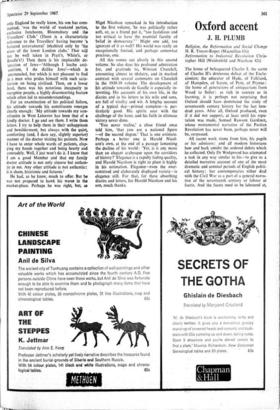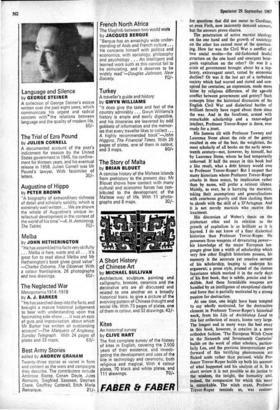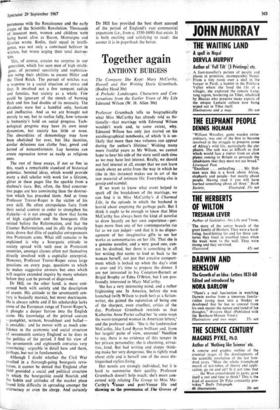Oxford accent
J. H. PLUMB
Religion, the Reformation and Social Change H. R. Trevor-Roper (Macmillan 63s) Reformation to Industrial Revolution Chris- topher Hill (Weidenfeld and Nicolson 42s)
The home of beleaguered Charles I; the scene of Charles II's dexterous defeat of the Exclu- sionists; the educator of Hyde, of Falkland, of Hampden, of Ireton, of Pym, of Prynne: the home of generations of antiquarians from Wood to Salter: as rich in sources as in learning, it is perhaps not surprising that Oxford should have dominated the study of seventeenth century history for the last hun- dred years. After all, Oxford produced, even if it did not support, at least until his repu- tation was made, Samuel Rawson Gardiner, whose monumental narrative of the Puritan Revolution has never been, perhaps never will be, surpassed.
All recent work stems from him, his pupils or his admirers: and all modern historians hew and hack amidst the ordered debris which he collected. Only Dr Wedgwood has attempted a task in any way similar to his—to give us a detailed narrative account of one of the most dramatic and seminal periods of English politi- cal history: her contemporaries either deal with the Civil War as a part of a general narra- tive of the seventeenth century or labour at facets. And the facets need to be laboured at,
for questions that did not occur to Gardiner, or even Firth, now insistently demand answers, but the answers prove elusive.
The penetration of active marxist ideology on the one hand and the growth of sociology on the other has caused most of the question- ing. How far was the Civil War a conflict of two social modes—the old-fashioned feudal structure on the one hand and emergent bour- geois capitalism on the other? Or was it a crisis of government brought about by a top- heavy, extravagant court, rotted by economic decline? Or was it the last act of a turbulent society which had warred and rioted and con- spired for centuries; an expression, made more bitter by religious difference, of the age-old conflict between government and gentry? Such concepts litter the historical discussion of the English Civil War and dialectical battles of brilliant ferocity have raged about them since the war. And in the forefront, armed with remarkable scholarship and a razor-edged intellect, Professor Trevor-Roper is there, ever ready for a joust.
His famous tilt with Professor Tawney and Laurence Stone about the role of the gentry resulted in one of the best, the weightiest, the most scholarly of all books on the early seven- teenth century—not, however, by himself, but by Laurence Stone, whom be had temporarily unhorsed. If half the essays in this book had a like result, what a debt history would owe to Professor Trevor-Roper! But 1 suspect that many historians whom Professor Trevor-Roper attacks in these essays, by implication rather than by name, will prefer a reticent silence. Mainly, as ever, he is harrying the marxists; taking their assumptions and generalisations with courteous gravity and then slashing them to shreds with the skill of a D'Artagnan. And it is not merely marxists who receive this treatment.
His discussion of Weber's thesis on the protestant ethic and its relation to the growth of capitalism is as brilliant as it is learned. I do not know of a finer dialectical historian than Professor Trevor-Roper. He possesses three weapons of devastating power— his knowledge of the major European lan- guages gives him a width of scholarship which very few other English historians possess, his memory is the accurate yet creative servant of his scholarship, leaping underpin his argument; a prose style, pruned of the riotous luxuriance which marked it in the early days of his first book, that is subtle, precise and in- delible. And these formidable weapons are handled by an intelligence of exceptional clarity and force that is partially motivated by a strong passion for destruction.
At one time, one might have been tempted to say wholly motivated, for the destructive element in Professor Trevor-Roper's historical work, from his Life of Archbishop Laud to this last collection of essays, looms very large. The longest and in many ways the best essay in this book, however, is creative in a more orthodox fashion. 'The European Witch Craze in the Sixteenth and Seventeenth Centuries' builds on the work of other scholars., particu- larly Lea, and the previous interpretations put forward of this terrifying phenomenon are flicked aside rather than pursued, while Pro- fessor Trevor-Roper builds up both his account of what happened and his analysis of it. In a short review it is not possible to do justice to the wisdom, the insight, the humanity and, indeed, the compassion for which this essay is remarkable. The witch craze, Professor Trevor-Roper reminds us, was contern-
poraneous with the Renaissance and the early stages of the Scientific Revolution. Thousands of innocent men, women and children weie being burnt alive as Bacon, Montaigne and Grotius wrote. Bodin, their equal in intelli- gence, was not only a convinced believer in witches, but wrote urging their total destruc- tion.
This, of course, creates no surprise in our generation, which has seen men of high intelli- gence, of personal sensitivity and sophistica- tion using their abilities to excuse Hitler and the Third Reich. The pursuit of witches was a response to a social situation of stress and fear. It involved not a few rampant sadists and fanatics, but society as a whole. Few could be ignorant of the stench of burning flesh and few had doubts of its necessity. The dissidents were but a handful only, hesitant and ineffective. And so we are brought not merely to see, but to realise fully, how tenuous is humanity's hold on social progress. Tech- nological progress may have its own inner dynamism, but society has little or none. The absurdities of demonology may have been abolished for ever, but like inanities, similar delusions can clothe fear, greed and hatred of nonconformists. Lay heresies can create repressive terror as easily as religious ones.
The rest of these essays, if not so fine 'As- this, reach a remarkable standard of historical polemics. Seminal ideas, which would provide many a dull scholar with work for a lifetime, glitter in these pages like the sparkle from a duchess's tiara. But, often, the final construc- tive pages are less convincing than the destruc- tion which has preceded them. And at times Professor Trevor-Roper is the victim of his own skill. He often extrapolates facts froM their social context in order to strengthen his dialectic—it is not enough to show that forms of high capitalism and the bourgeois elite existed before the Reformation, and that the Counter Reformation, and its ally the princely state, drove that elite of capitalist entrepreneurs into Protestant arms. What still remains to be explained is why a bourgeois attitude to society spread with such ease in Protestant countries, amongst classes often not themselves directly involved with a ,capitalist enterpria However, Professor Trevor-Roper raises large questions on every page, questions to which he makes suggestive answers but ones which will require extended inquiry by many scholars before they can be proved or disproved.
Dr Hill, on the other hand, is more con- cerned both with society and the description of events. His attitude to the seventeenth cen- tury is basically marxist, but never doctrinaire. He is always subtle and if his scholarship lacks some of the European range of Trevor-Roper's, it ploughs a deeper furrow into the English scene. His knowledge of the printed sources —pamphlet, sermon, broadsheet and ballad— is enviable: and he moves with as much con- fidence in the economic "and social structure of seventeenth century England as he does in the politics of the period. I find his view of the seventeenth and eighteenth centuries very convincing: arguable in detail here and there, perhaps, but not in fundamentals.
Although I doubt whether the Civil War resulted in a thorough-going bourgeois revo- lution, it cannot be denied that England after 1660 provided a social and political structure in which the bourgeoisie could flourish and the habits and attitudes of the market place found little difficulty in spreading amongst the aristocracy or even the clergy. And certainly Dr Hill has provided the best short account of the period of England's vast commercial expansion (i.e., from c. 1550-1600) that exists. It is both exciting and satisfying to read: the sooner it is in paperback the better.








































 Previous page
Previous page